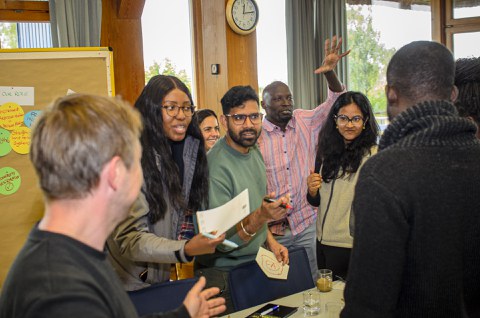Midterm Study Tour für die Internationalen Klimaschutzstipendiat:innen der AvH, 2024
Wie wird aus wissenschaftlicher Erkenntnis wirksame Politik?

Ein Sonnenaufgang in Dresden. Es ist der 14 Oktober 2024 und ein besonderer Tag für eine Gruppe von Menschen der Alexander von Humboldt Stiftung.
Dieser essenziellen Frage gingen die International Climate Protection Fellows der Alexander von Humboldt-Stiftung, während ihrer Midterm Study Tour 2024 nach. Organisiert vom CIPSEM an der TU Dresden haben wir uns an drei besonderen Orten umfassend mit Herausforderungen des Klima- und Umweltschutzes auseinandergesetzt – durch Expertendialoge, Exkursionen, praktische Workshops und kulturelle Erlebnisse an verschiedenen Schauplätzen.
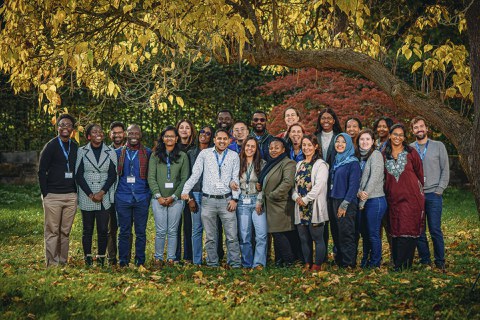
Gruppenfoto mit den Stipiendaten der Alexander von Humboldt Stiftung und mit Alumni Dr. Mulczyk und mit Dr. Dechyeva und Dr. Görner vom Team CIPSEM
Die Studienreisen verbinden auf einzigartige Weise fachliche Tiefe mit persönlichem Austausch mit den Referent:innen. Von nachhaltiger Stadtentwicklung über transformative Klimapolitik bis hin zu internationalen Naturschutzverhandlungen gewinnen die Fellows der Alexander von Humboldt Stiftung wertvolle Einblicke, die ihre bisherigen Kenntnisse mit neuen Erfahrungen und Kontakten bereichern.
Auch die Studienreise 2024 schuf in den Workshops und den Exkursionen nicht nur neues Wissen, sondern auch neue Impulse für ein lebendiges globales Netzwerk von engagierten Klimaschützenden.
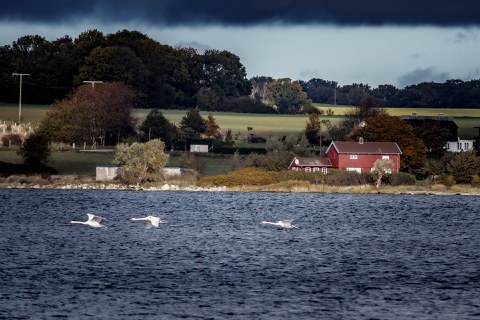
Auf der letzten Etappe der Studienreisen besuchen wir die Naturschutzinsel Vilm bei Rügen. Wir erleben eine bunte Flora und Fauna. Drei Schwäne fliegen über den Bodden. Es sieht aus wie ein Gemälde.
Die erste Station führte in das Herz von Sachsen. In Dresden erlebten die Fellows, wie wissenschaftliche Evidenz den Weg in Gesetze und kommunale Abkommen findet – und welche Hürden dabei zu überwinden sind.
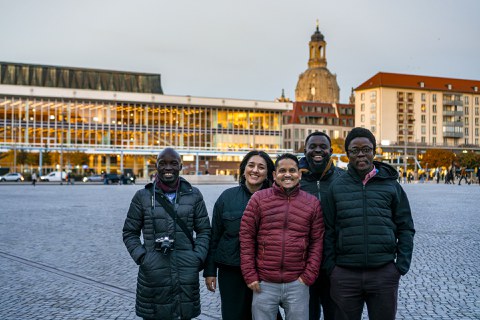
Auf dem Weg zum Networkingdinner nehmen sich die Fellows Zeit für ein Gruppenfoto auf dem Altmarkt mit der Frauenkirsche im Hintergrund, dem Wahrzeichen von Dresden.
Montag, 14. Oktober: Vom Hörsaal in die Stadtplanung
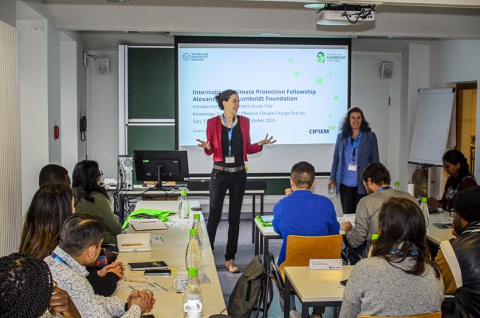
Dr. Görner - Geschäftsleiterin am CIPSEM und Dr. Dechyeva - Projektkoordinatorin der Midterm Studytour empfangen die Fellows der Alexander von Humboldt Stiftung.
Am Montag bereiteten wir den Fellows einen herzlichen Empfang. Dr. Anna Görner, Geschäftsführerin des CIPSEM, und Dr. Daryna Dechyeva, Organisatorin der Midterm Studytour, begrüßten die Teilnehmenden und führten sie in das Kursprogramm ein.
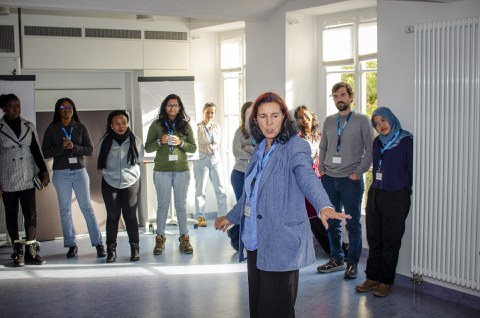
Dr. Daryna Dechyeva unterstützt die Stipendiaten während des sehr beliebten Workshops „Leben in Deutschland“, der dazu beiträgt, am ersten Tag das Eis zu brechen.

Die Fellow-for-Fellow-Session „Leben in Deutschland“ fördert jedes Jahr den Austausch und die Vernetzung zwischen den Klimaschutz-Stipendiaten am CIPSEM.

Die Fellows teilen ihre Geschichten im Workshop - Leben in Deutschland.
Anschließend begleiteten sie die Gruppe zum ersten Workshop am Leibniz-Institut für ökologische Raumentwicklung (IÖR), wo die Fellows einen Einblick in die komplexe Welt nachhaltiger Stadtentwicklung erhielten.

Am Leibniz Institut für ökologische Raumentwicklung e.V. treffen wir Prof. Dr. Wolfram (am Pult) & Dr. Mazarro (seated) und Dr. Joshi.
Besonders beeindruckt zeigten sie sich von den Beiträgen von Prof. Wolfram, Dr. Joshi und Dr. Mazarro, die verdeutlichten, dass technische Lösungen allein nicht genügen.
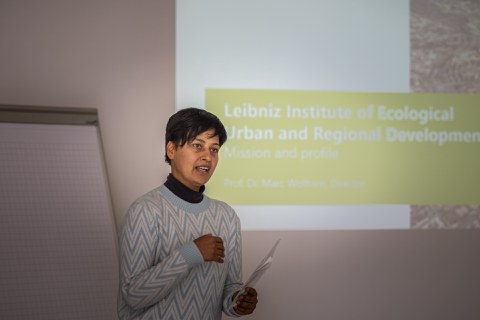
Transformative Prozesse in der nachhaltigen Entwicklung von Dr. Neelakshi Joshi, wissenschaftliche Mitarbeiterin am IÖR in Dresden
Echte Nachhaltigkeit entsteht erst durch integrative Ansätze, die soziale Gerechtigkeit und ökonomische Faktoren gleichermaßen berücksichtigen.

Rundgang mit Dr. Schielicke durch das Leibniz Institut für ökologische Raumentwicklung und Präsentation der nachhaltigen Bauweise.
In der anschließenden Diskussion wurde deutlich, wie sehr die Fellows das Zusammenspiel von Wissenschaft und Stadtpolitik schätzen:
„Dieser Tag hat mir gezeigt, dass Städte nicht nur aus Materialien, sondern vor allem aus Werten erbaut werden.“

Transformative Prozesse in der nachhaltigen Entwicklung von Wissenschaftlicher Mitarbeiter Dr. Mazarro vom IÖR in Dresden
Dienstag, 15. Oktober: Die menschliche Seite der Transformation

Der Workshop Leadership mit Britta Heine
Der zweite Tag der Midterm Study stand ganz im Zeichen von Leadership und persönlicher Wirksamkeit. Im Workshop „Leading Transformation for Climate Protection“ mit Britta Heine rückten nicht Zahlen oder Modelle in den Mittelpunkt, sondern die Menschen selbst.
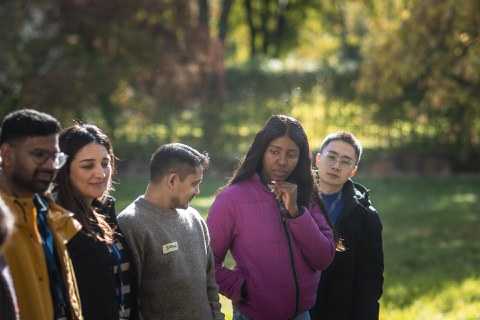
Interaktive Übung an der frischen Luft im Workshop Leadship.
Wie lassen sich andere mobilisieren? Wie können wir Widerstände in Kommunikation und Verhalten überwinden? Die interaktiven Übungen machten eindrucksvoll deutlich, dass erfolgreiche Klimapolitik mindestens ebenso sehr von zwischenmenschlichen Kompetenzen abhängt wie von fachlichem Wissen.
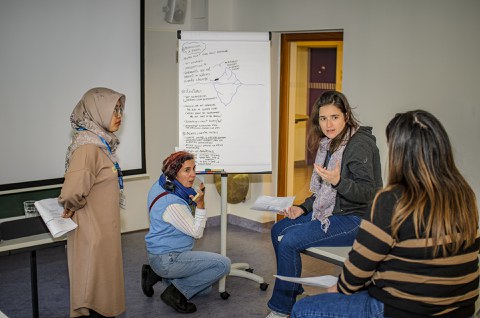
Gruppenarbeit im Workshop für Leadership.
In den Übungen erfuhren die Fellows, wie sich Veränderung anfühlt – und was sie braucht, um wirksam zu werden.

Die Fellows schätzten den Workshop mit Britta Heine sehr.

Fellow Adam KYOMUHENDO am Ende des Workshop von Britta Heine.ndation Study Tour 2024
Viele beschrieben den Workshop als einen der intensivsten und inspirierendsten Momente der Tour:
„Diese Erfahrung machte mir klar, dass Führung nicht Kontrolle, sondern Verbindung bedeutet.“
Mittwoch, 16. Oktober: Energiewende zum Anfassen
Praktisch wurde es am dritten Tag mit der Renewables Academy (RENAC) AG.

Charlene Rossler und Marta Stetsiv von der Renewables Academy (RENAC) AG

Brainstorming im interaktiven Workshop der Renewables Academy (RENAC) AG.
In einem dynamischen Rollenspiel schlüpften die Fellows in die Rollen von Entscheidungsträgerinnen und Entscheidungsträgern,

Erholsame Impulse in der Pause während der Pausen im Workshop von der Renac AG.
die über Wege in eine kohlenstofffreie Wirtschaft verhandelten Der Workshop war intensiv, inspirierend – und machte trotz hoher Konzentration großen Spaß.

Gabriel Kpaka bekommt ein Zertifikat über die Teilnahme am Workshop der Renac AG.
Das anschließende Networking-Dinner mit der Alexander von Humboldt-Stiftung bot Gelegenheit, die entstandenen Kontakte zu vertiefen und neue Kooperationen zu knüpfen.
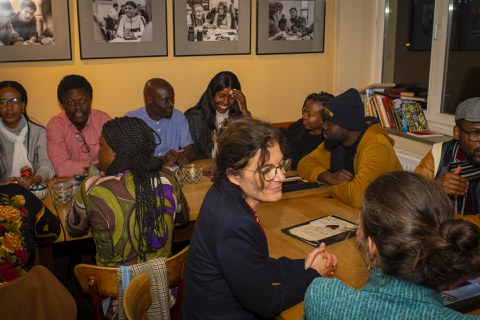
Networkingdinner mit Vertretterinnen der Alexander von Humboldt Stiftung in Dresden.
Donnerstag, 17. Oktober: Klimawandel im Experiment – Wissenschaft zum Anfassen
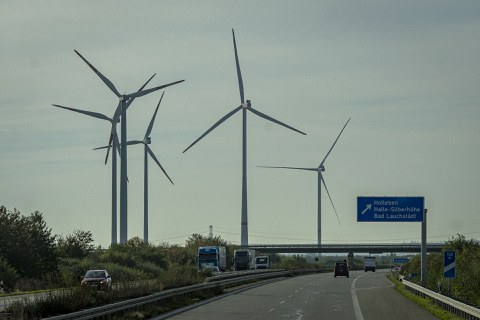
Mit Rückenwind nach Bad Lauchstädt.
Im Helmholtz-Zentrum für Umweltforschung (UFZ) in Bad Lauchstädt verließen wir die Welt der Theorien und betraten die der empirischen Forschung.
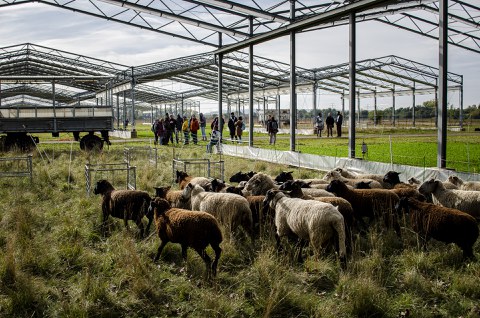
Schafe sind ein Teil der Global Change Experimental Facility

Prof Dr François Buscot - m Helmholtz-Zentrum für Umweltforschung (UFZ)
Unter fachkundiger Leitung von Prof. Buscot und Dr. Reitz erhielten die Fellows Einblick in Langzeitexperimente zu den Auswirkungen des Klimawandels auf Graslandökosysteme.

Prof Dr François Buscot & Aster Hordofa - Global Change Experimental Facility (GCEF)
Die anschaulichen Demonstrationen machten deutlich, wie empfindlich ökologische Gleichgewichte auf Temperatur- und Niederschlagsveränderungen reagieren – und wie entscheidend evidenzbasierte Forschung für politische Entscheidungen ist.

Prof. Dr. François Buscot & Fellows AvH 2024 - Global Change Experimental Facility (GCEF)
Die Teilnehmenden zeigten sich beeindruckt von der methodischen Präzision und der klaren Verbindung zwischen Forschung und Politik:
„Die Beobachtung der Experimente führte mir vor Augen, wie viel Geduld die Wissenschaft braucht – und wie viel Dringlichkeit die Politik hingegen aufbringen sollte.“
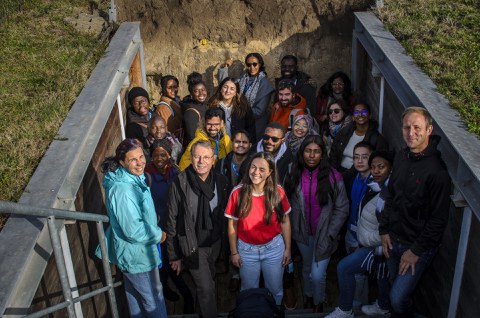
Ein Gruppenfoto mit Bodenprofil auf dem Gelände des UFZ. Im Bild rechts Dr. Reitz.

Auf dem Rückweg nach Dresden gab es eine kleine Staddtführung in Leipzig.
Freitag, 18. Oktober: Wissenschaft trifft Aktivismus
Am CIPSEM begann der Tag mit einem tiefen Einblick in die praktische Umsetzung von Naturschutz auf kommunaler Ebene.

Dr. Sabine Hänel von der Landeshauptstadt Dresden.
Dr. Sabine Hänel von der Landeshauptstadt Dresden führte die Fellows in das Großprojekt „DresdenNATUR“ ein. Sie verband die wissenschaftliche Fundierung mit greifbarer Stadtnatur.
Besonders die konkreten Projektbeispiele, die die kreative Verbindung von Klimaschutz und Biodiversität in urbanen Räumen aufzeigten, machten die komplexen Herausforderungen und Lösungsansätze einer Großstadt unmittelbar nachvollziehbar.
Im anschließenden Kurs entführte uns Dr. Jessica Junker von Re:wild in die globalen Dimensionen des Artenschutzes.
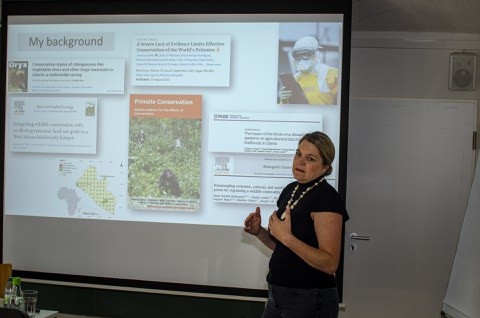
Dr. Jessica Junker von Re:wild

Eine Verbindung zur Natur. Ein seltener Moment. Ein Mandrill hält für einen Moment still und blickt in die Kamera.
Ihre leidenschaftlich vorgetragenen Forschungserkenntnisse zur Bedrohung von Menschenaffen, insbesondere durch den Bergbau, lieferten ein eindrückliches Fallbeispiel für die Verflechtung von Wirtschaftsinteressen, ökologischen Folgen und internationalen Schutzbemühungen.
Ihre Arbeit, an der Schnittstelle von Feldforschung und evidenzbasierter Politikberatung, verlieh dem Konzept der „Science-Policy Interface“ ein konkretes Gesicht.
Die Fellows beschrieben ihre Eindrücke mit Dr. Junker als:
„Das war großartig! Dies war eine absolut fesselnde Session! Jessica Junker hat einen fesselnden Erzählstil, und ihre Leidenschaft für das Thema war spürbar.“

Christian Bläul spricht über seine Zeit bei Fridays For Future.
Ein weiterer Höhepunkt war der Austausch mit Christian Bläul von Fridays for Future. Seine engagierte Perspektive brachte eine lebhafte Diskussion in Gang, die die Spannung zwischen politischer Beharrlichkeit und gesellschaftlicher Dringlichkeit spürbar machte.
Hier wurde das theoretische Konzept der „Advocacy Coalitions“ lebendig – sichtbar in der Dynamik zwischen Forschung, Zivilgesellschaft und Politik.

Fellows bei einer Think-Tank-Sitzung mit der Last Generation

Am letzten Tag in Dresden genosseen die Fellows eine kleine Stadtführung in der historischen Landeshauptstadt Dresden.
Insel Vilm: Wo globale Verantwortung Gestalt annimmt
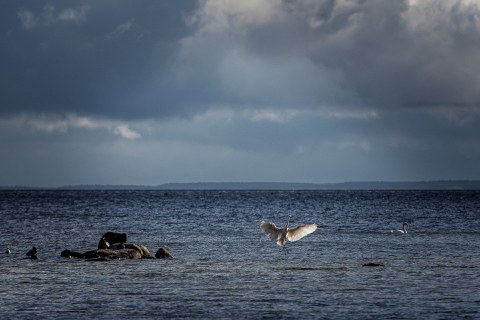
Am Tag der Ankunft auf Vilm sehen wir einen weißen Reiher majestätisch in der Bucht landen, während wir uns Koffer müde ziehen.
Die abgelegene Insel Vilm bei Rügen bot den idealen Rahmen für Reflexion und vertieften Austausch. Umgeben von unberührter Natur tauchten die Fellows in die komplexe Welt internationaler Umweltverhandlungen ein.

Verschlafen, wie eine Decke, liegt der Wald von Vilm im Nebel des Sonnenaufgang.
Montag, 21. Oktober: Eintauchen in die Welt des Naturschutzes

Führung über die Insel Vilm durch Irene Lautenschlager von der Internationalen Akademie für Naturschutz.
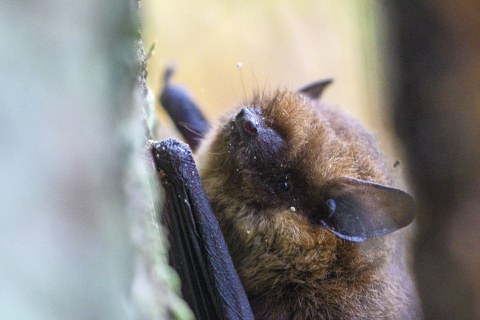
Eine Fledermaus klettert in einem (fast) natürlichen Wald auf Vilm auf einen Baum.
Nach einer eindrucksvollen Führung durch das Naturschutzgebiet vermittelte die Internationale Naturschutzakademie (INA) praxisnahe Einblicke in die Realität internationaler Verhandlungen.
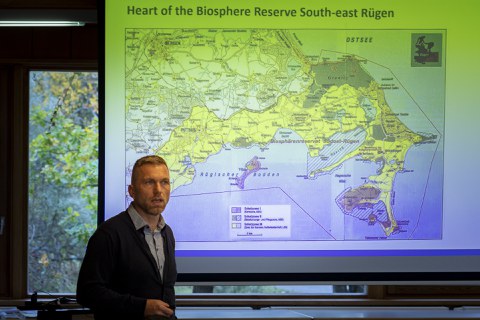
Dr. Thomas Goettert Head of Division for the International Academy for Nature Conservation and Event Management
Die Sessions mit Dr. Göttert verdeutlichten, dass der Schutz globaler öffentlicher Güter wie der Biodiversität stets ein Balanceakt zwischen Staaten mit unterschiedlichen Interessen und Möglichkeiten bleibt.

Ein Weißreiher landet in der Bucht von Vilm.

Dieser Baum steht wie ein Denkmal und ist das geheime Wahrzeichen dieser Insel. Die Menschen verteidigten diesen Wald bereits gegen die Abhoolzung durch die Truppen von Napoleon vor über 200 Jahren.
Dienstag, 22. Oktober: Menschliche Geschichten hinter den Verträgen
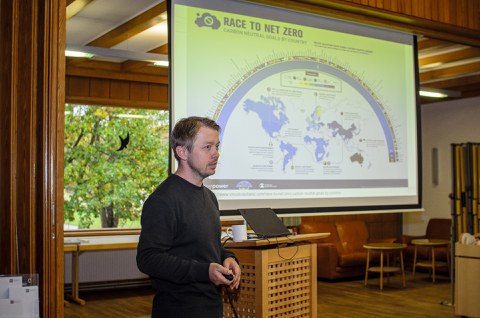
Dr. Michael Huettner von der Deutsche Gesellschaft für Internationale Zusammenarbeit (GIZ) GmbH
Dr. Michael Huettner (GIZ) verknüpfte Klimapolitik mit dem Schutz tropischer Wälder und zeigte eindrucksvoll, wie eng beides zusammenhängt. Die Filmvorführung „Guardians of the Earth“ brachte die abstrakten Prozesse der UN-Klimaverhandlungen auf eine zutiefst menschliche Ebene und machte sichtbar, welche persönlichen Geschichten, Spannungen und Machtungleichgewichte sich hinter diplomatischen Texten verbergen.

Andrew Asaviansa liebt es, durch unberührte Naturwälder zu wandern.
„Auf Vilm wurde mir bewusst, dass der Schutz der Biodiversität mehr ist als Naturschutz – er ist auch ein Akt des Vertrauens zwischen Nationen.“
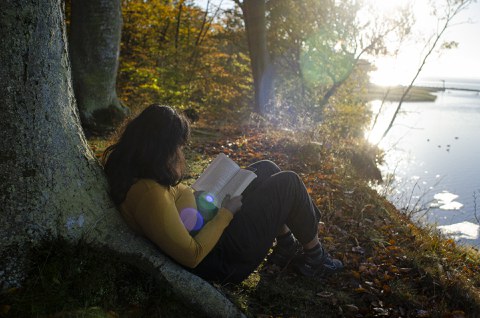
Sukanya Janardhanan, Stipendiatin der Alexander von Humboldt-Stiftung, liest gerne ein Buch am Ufer von Vilm.
Die ruhige Atmosphäre der Insel wurde von vielen als inspirierend und „grounding“ beschrieben. In den abendlichen Gesprächen – oft bei Kerzenlicht oder Spaziergängen am Meer – entwickelten sich neue Freundschaften und Kooperationen, die weit über das Programm hinausreichen.
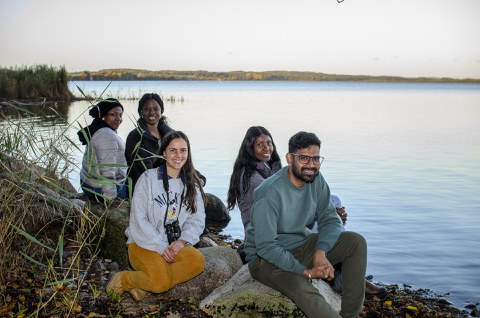
Gemeinsamer Spaziergang und den Tag am Wasser reflektieren.
Mittwoch, 23. Oktober: Natürliche Lösungen für komplexe Probleme
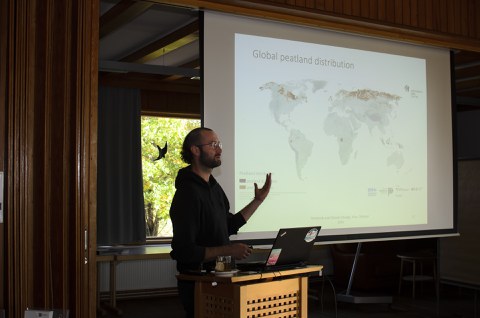
Die Rolle von Mooren im Klimaschutz von Felix Beer vom Moorzentrum Greifswald
Zwei besonders inspirierende Beiträge warteten an diesem Tag: Gregory Fuchs (Ecologic Institute) analysierte sozial-ökologische Systeme, während Felix Beer (Greifswald Mire Centre) am Beispiel der Moore zeigte, wie Nature-based Solutions konkret wirken können.
Der Kontrast zwischen diesen greifbaren Lösungen und den oftmals schwerfälligen politischen Prozessen ließ die zentrale Frage aufkommen: Warum setzen wir nicht längst um, was wir schon wissen?

Stehen, Starten, Fliegen. Drei Graureiher in der flachen Bucht von Vilm.
Donnerstag, 24. Oktober: Abschied und Ausklang
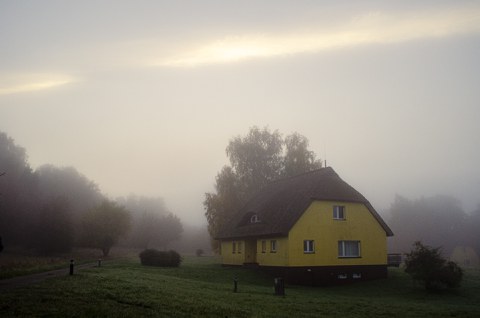
Die Unterkünfte im Morgenneebel auf der Insel Vilm.

Avh Fellow Prof. Chhaya Bhardwaj nimmt eine Pause auf der Sonnenterrasse.
Der letzte Tag begann mit Einblicken in internationale Klimafinanzierung durch die International Climate Initiative (IKI). Besonders eindrücklich waren die historischen
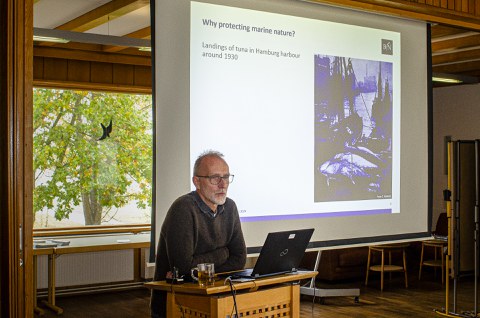
Dr. Jochen Krause vom Meeresnaturschutz und Meeresklimaschutz.
Aufnahmen von Dr. Krause und Dr. Morys zum Meeresnaturschutz – etwa das Foto eines sechs Meter langen Thunfischs im Hamburger Hafen um 1950, das den Wandel unserer Ozeane eindrucksvoll vor Augen führte.
Am Nachmittag nutzten viele Teilnehmende die Gelegenheit, in stillen Spaziergängen die intensiven Eindrücke der Woche nachklingen zu lassen.

Der letzte Gemeinsame Spaziegang auf Vilm.
Eine feierliche Abschlusszeremonie bildete den würdigen Rahmen, um die gemeinsame Reise zu beschließen und neue Partnerschaften zu festigen.

Die Stipendiaten der Alexander von Humboldt-Stiftung 2024 feiern ihre Zeit und ihre Bemühungen während der Studientour auf Vilm.
Fazit: Theorie und Praxis nachhaltig verknüpft

Natürliche Lösungen für komplexe Probleme.
Die Midterm Study Tour 2024 war mehr als eine Studienreise – sie war ein Lernprozess über Grenzen hinweg.
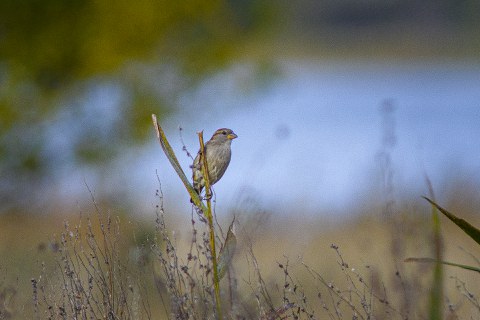
Arten wie dieser Fink - woanders durch den Menschen verdrängt, leben auf Vilm in einem geschützten.
In den Evaluationen lobten die Fellows besonders die klare Struktur, die thematische Vielfalt und den hohen Praxisbezug. Die Fellows sagten an, dass sie durch die Tour neue Impulse für ihre eigene Arbeit gewonnen haben und fühlten sich in ihrer Fähigkeit gestärkt, wissenschaftliche Erkenntnisse in politische oder gesellschaftliche Wirkung zu übersetzen.
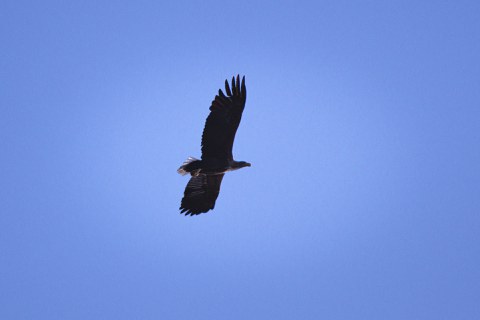
Am Tag der Abreise zeigte sich endlich der Seeadler. Als würde er Aufwiedersehen sagen wollen.
Die Reise machte sichtbar, dass nachhaltige Transformation nicht allein durch Fakten gelingt, sondern durch Beziehungen – zwischen Disziplinen, Institutionen und Menschen.
Sie zeigte, wie wertvoll Räume des Dialogs sind, in denen Wissen geteilt, Vertrauen aufgebaut und Mut zur Veränderung wächst.

Der letzte gemeinsame Spaziergang auf Vilm. Keine andere Geste verdeutlicht wie die Stipiendiaten die Studienreise emfpanden.
Viele Fellows beschrieben die Tour als einen Wendepunkt:
„Dies war mehr als eine Studienreise – es war eine eindrückliche Bestätigung, dass unsere Arbeit einen wirklichen Unterschied macht.“
Am Ende bleibt die Erkenntnis: Wissenschaft ist nur dann lebendig, wenn sie in Begegnung tritt – mit Politik, mit Gesellschaft, mit dem Menschen selbst.
Die Brücken, die auf dieser Reise gebaut wurden, tragen weiter – in Projekte, Kooperationen und gemeinsame Visionen einer nachhaltigen Zukunft.
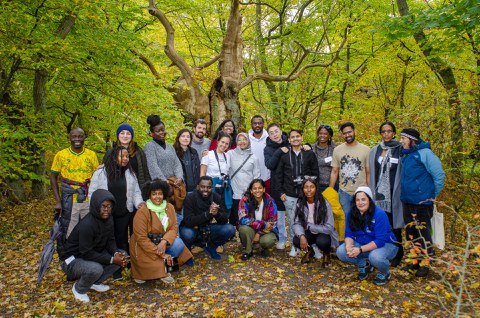
Ein Gruppenfoto auf Vilm. Die Fellows mit Irene Lautenschlager und Dr. Dechyeva.
Das CIPSEM-Team der TU Dresden dankt allen Beteiligten – insbesondere der Alexander von Humboldt-Stiftung, den Gastinstitutionen und den Fellows – für ihr Engagement, ihre Offenheit und den gemeinsamen Geist, der diese Reise geprägt hat.

Die Fähre, die einzige Verbindung zwischen Vilm und dem Festland. Mit Stille genossen wir die Rückfahrt und den Ausblick.
Das Programm „International Climate Protection Fellows – Knowledge Transfer for Effective Climate Change Policies“ ist ein zentraler Bestandteil des International Climate Protection Fellowship-Programms, das von der Alexander von Humboldt-Stiftung in Zusammenarbeit mit dem Auswärtigen Amt der Bundesrepublik Deutschland, dem Bundesverband der Deutschen Industrie e.V. (BDI), dem Deutschen Akademischen Austauschdienst (DAAD), der Deutschen Bundesstiftung Umwelt (DBU), der Deutschen Gesellschaft für Internationale Zusammenarbeit GmbH (GIZ), der Renewables Academy (RENAC) und CIPSEM TU Dresden organisiert wird.
Wenn Sie mehr über das Programm erfahren möchten, nutzen Sie bitte diese Links:
TU Dresden CIPSEM: Startseite — Centre for International Postgraduate Studies of Environmental Management (CIPSEM) — TU Dresden
Alexander von Humboldt Stiftung: Sponsorship during your International Climate Protection Fellowship - Alexander von Humboldt-Foundation

